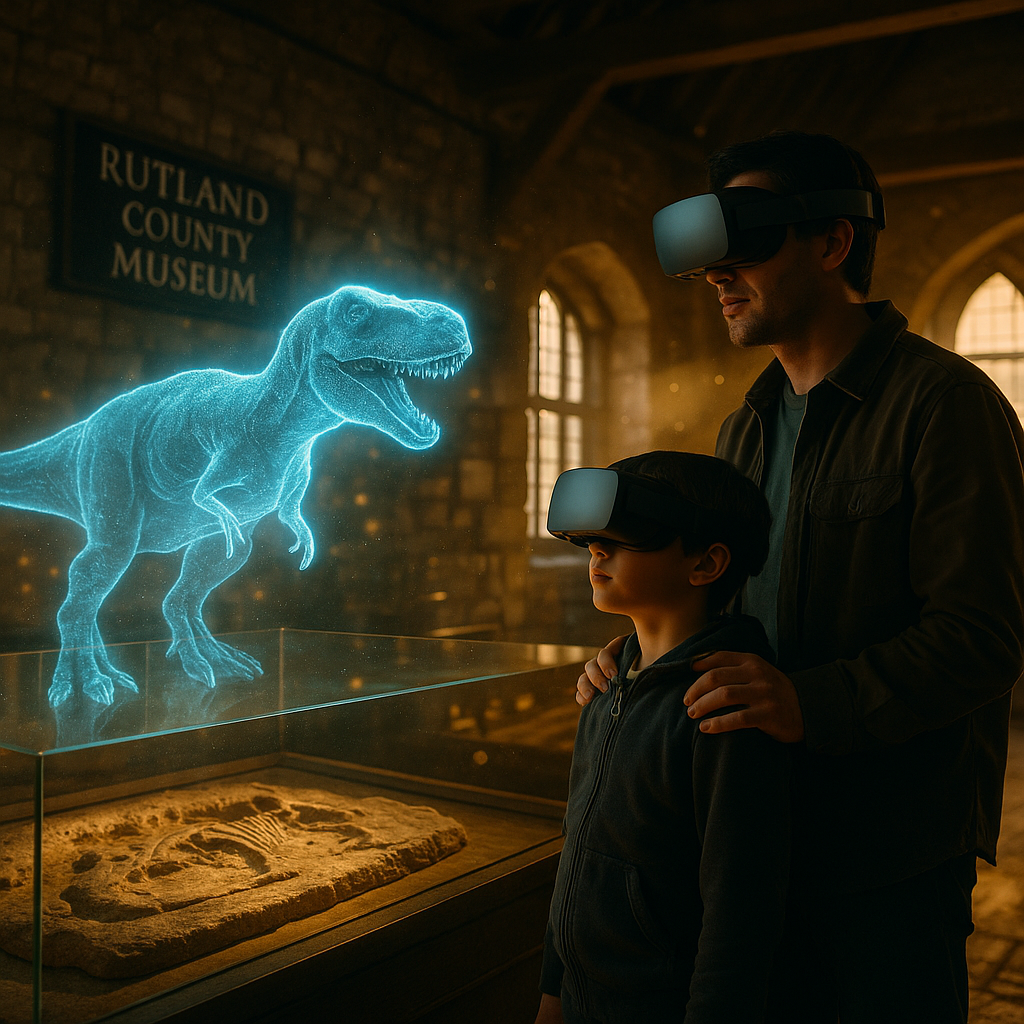
Visitor numbers double at Rutland County Museum following launch of VR exhibition. This striking increase highlights the power of blending technology with heritage to create compelling visitor experiences.
Rutland County Museum recently unveiled a groundbreaking virtual reality exhibition that transforms how visitors engage with local history. The digital exhibition launch presents immersive, interactive content designed to captivate audiences of all ages. Features include a VR Jurassic adventure and augmented reality displays, making historical artifacts come alive in ways traditional exhibits cannot match.
This innovative approach addresses common challenges faced by museums seeking to attract diverse and younger audiences. By integrating cutting-edge technology, Rutland County Museum sets a new standard for cultural institutions aiming to boost engagement and visitor numbers.
The success of this VR-enabled digital exhibition marks a pivotal moment—demonstrating how embracing innovation can redefine museum experiences and drive significant growth in attendance.
Rutland County Museum’s new digital exhibition represents a bold step forward in how local history and heritage can be experienced by visitors of all ages. The exhibition uses immersive technology, including virtual reality (VR), augmented reality (AR), and interactive displays, to bring Rutland’s rich past to life in an exciting and hands-on way.
The exhibition showcases several pioneering features designed to bring Rutland heritage and local discoveries to life:
At the heart of the exhibition is a VR experience that plunges visitors beneath prehistoric seas to encounter the Rutland Sea Dragon, Britain’s largest and most complete ichthyosaur fossil. This immersive environment allows you to explore the ancient marine world in three dimensions, creating a deep connection with this extraordinary part of Rutland’s natural history.
The VR journey includes an engaging fossil excavation simulation. Visitors get to try their hand at uncovering virtual fossils, mimicking the real-life thrill of discovery. This hands-on approach encourages active participation rather than passive observation, making it especially appealing for families and school groups.
A highlight is the striking 3D interpretation of the Ketton Roman Mosaic, one of Britain’s most significant archaeological finds. Created by street artist Julian Beever, this digital artwork invites visitors to view the mosaic from new perspectives, enhancing appreciation for Roman-era craftsmanship and Rutland’s role in ancient history.
Younger visitors can engage with an iSandbox augmented reality feature where they manipulate sand to reveal hidden fossils or trigger volcanic eruptions. This touch-responsive play blends education with entertainment, sparking curiosity about geology and paleontology through a dynamic sensory experience.
These technologies work together to create an interactive museum experience where learning unfolds naturally through exploration and discovery. By moving beyond static displays or traditional glass cases, Rutland County Museum has embraced modern tools that appeal across generations.
The integration of AR and VR opens up new possibilities for storytelling within museum contexts. Rather than simply presenting artifacts behind protective barriers, these tools immerse you in the story behind each object—the environmental conditions that shaped it, its cultural significance, or the excitement of uncovering it yourself.
Visitors frequently comment on how this approach makes complex historical material accessible without sacrificing depth or accuracy. It respects both academic rigour and visitor engagement, offering multiple entry points into Rutland’s heritage whether you are a lifelong enthusiast or encountering these stories for the first time.
This blend of digital exhibition elements also supports inclusivity; visual, auditory, and tactile components cater to diverse learning styles and abilities. The museum reflects a growing trend where immersive technology enriches cultural sites by fostering emotional connections alongside intellectual understanding.
Experiencing Rutland’s heritage through such innovative means reveals how museums can evolve in the digital age while championing local identity. These technologies do not replace traditional exhibits but enhance them—inviting more visitors to appreciate what makes Rutland unique through memorable encounters grounded in cutting-edge engagement methods.
Rutland County Museum plays a vital role in preserving Rutland heritage and showcasing local discoveries that define the region’s rich cultural identity. Two standout artifacts highlighted in the new digital exhibition are the Rutland Sea Dragon, Britain’s most complete ichthyosaur fossil, and the Ketton Roman Mosaic, a significant archaeological treasure reimagined through immersive technologies.
The state-of-the-art digital exhibition, launched in August 2025, incorporates cutting-edge virtual reality (VR) and augmented reality (AR) to create an interactive museum experience. Central to this is the VR Jurassic Adventure, which transports visitors beneath prehistoric seas to meet the Rutland Sea Dragon in a vivid, lifelike environment. This immersive technology offers more than visual spectacle—visitors actively engage by participating in a simulated fossil dig where they uncover ancient remains, mirroring real paleontological methods.
Key features include:
This innovative approach has been instrumental in doubling visitor numbers at Rutland County Museum following the VR exhibition launch, attracting families eager for both entertainment and education.
Visitor growth at Rutland County Museum has been striking since the introduction of the VR-enabled exhibition. Data from August 2025 reveals an almost 100% increase in museum attendance statistics compared to previous years during the same period. This surge highlights a clear connection between innovative digital offerings and heightened public interest.
Family engagement stands out as a key driver behind this success. The summer school holidays created an ideal window for families seeking educational yet entertaining activities. The museum’s VR Jurassic Adventure and interactive digital features appealed strongly to children and parents alike, making it a popular destination for family outings.
This level of interaction signals more than curiosity; it reflects genuine engagement with heritage through modern technology. The ability to blend education with entertainment has positioned Rutland County Museum as a forward-thinking institution, capable of attracting diverse audiences while promoting active learning during peak visitor periods such as school holidays.
The transformation at Rutland County Museum owes much to targeted UK Government funding, particularly through initiatives like the Levelling Up Fund and Shared Prosperity Funds. These financial resources have been crucial in enabling the museum to adopt cutting-edge technology that reshapes visitor experiences.
This strategic infusion of capital has allowed the museum to implement high-tech attractions such as virtual reality experiences and augmented reality play zones. These innovations are not just about showcasing heritage; they actively engage diverse audiences, making history accessible and exciting.
The investment aligns with broader cultural development goals set by Rutland County Council. It reflects a commitment to:
Such funding creates a foundation for sustainable growth, ensuring the museum remains a dynamic hub for heritage appreciation while embracing future technological advancements.
Rutland County Council is actively pursuing museum revitalisation plans aimed at establishing the Rutland County Museum as a flagship cultural destination in the region. This vision hinges on sustained and strategic ongoing investment in culture, building on the momentum created by the recent VR exhibition that helped visitor numbers double at Rutland County Museum.
The museum anticipates strong visitor peaks during upcoming periods like the October half term, driven by growing public interest and positive word-of-mouth from summer successes. These efforts position Rutland County Museum not just as a repository of history but as a vibrant hub where heritage meets cutting-edge technology.
The impact of virtual reality on museum visitor growth is evident at Rutland County Museum, where visitor numbers doubled after the launch of the VR exhibition. This success shows how immersive technology can change traditional museum experiences, making history accessible and interesting for various audiences. Museums that embrace digital innovation have the opportunity to strengthen community connections and attract new generations of visitors.
You have a special chance to discover Rutland’s history in a whole new way. Visit Rutland County Museum and immerse yourself in the Jurassic adventure—see for yourself why the VR exhibition has captured the attention of so many. Don’t miss out on this groundbreaking cultural experience.


